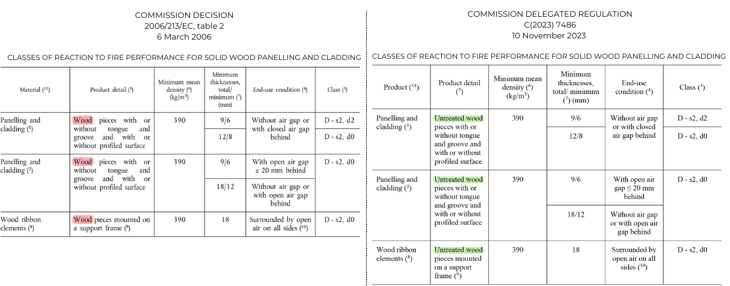On the 10th of November 2023, the European Commission adopted a Delegated Regulation (C(2023)7486) amending Commission Decision 2006/213/EC regarding the conditions for the reaction to fire classification of wooden cladding, panelling, and ribbon elements without testing.
The amendment aims to prevent misuse of the original decision and to ensure the safety of treated and/or modified wood products by enforcing a requirement to test any wooden cladding, panelling, or ribbon elements if the wood is modified or treated.
Focus on the effects of treatment or modification of wood on fire performance
The pivotal change in the regulation is that the classification, without further testing, now applies exclusively to untreated wood. This amendment addresses a critical concern regarding the fire performance of treated or modified wood, which could be significantly different from untreated wood.

Minimum Reaction to Fire Classification
A key update in the regulation is that all wood products, whether treated or untreated, must, at a minimum, meet the D-s2, d0 classification for fire safety, and this has to be proven through testing. This baseline ensures a consistent standard across all wood products used in construction, enhancing overall fire safety.
Expert Concerns and Fire Performance
For years, experts in the field have recognized that modifications or treatments (such as thermal or chemical modifications, painting, or impregnation) could adversely affect the fire performance of wood, potentially increasing its flammability. The new regulation acknowledges these concerns and mandates testing for any modified or treated wood cladding or paneling.
Impact on Cladding Producers
Wood products manufacturers are responsible for ensuring that their CE-marked cladding, paneling, and ribbon products, produced according to EN 14915, meet, at a minimum, the reaction to fire performance of D-s2, d0 when the wood is modified or treated.
Previously, producers have typically declared even modified and/or treated wood products in class D-s2,d0, without necessarily having tested the fire performance according to the single burning item (SBI) test (EN 13823) and consequently having classified the products under EN 13501-1 to the appropriate reaction to fire class. With the new delegated regulation, the responsibility falls on the producer placing the CE-declared end product on the market to ensure compliance to the delegated regulation.
Nordtreat offers a wide range of solutions for cladding and panel producers to comply with fire safety standards
Nordtreat offers translucent and opaque coatings, which meet a variety of classifications from D-s2, d0 all the way to the highest Euroclass for wood, B-s1, d0. The products are based on the unique bio-based NORFLAM® technology.
In addition to the extensive solutions offered, our experts assist wood products manufacturers in understanding and complying with the latest regulations.
Contact us for further information on wood coatings and treatments with certified reaction to fire performance


